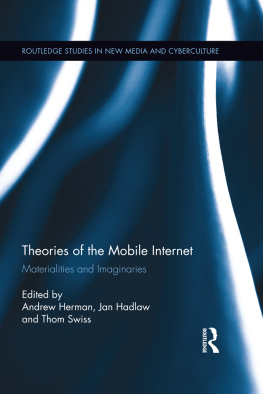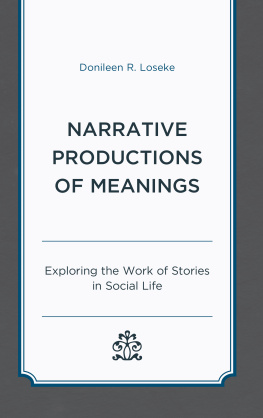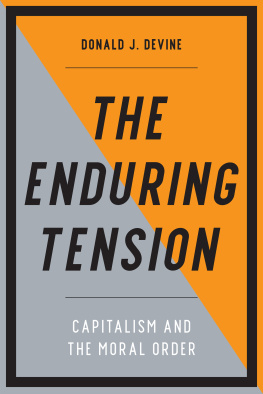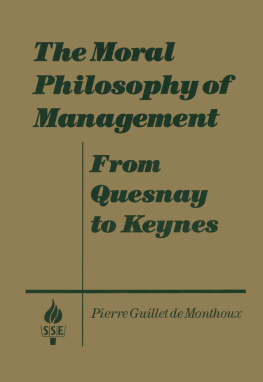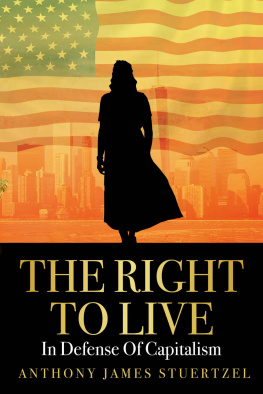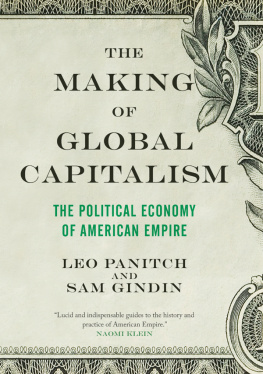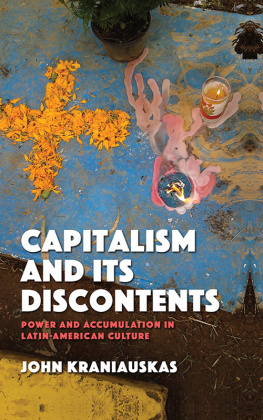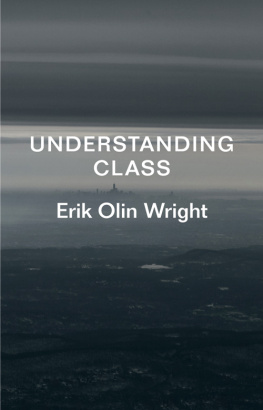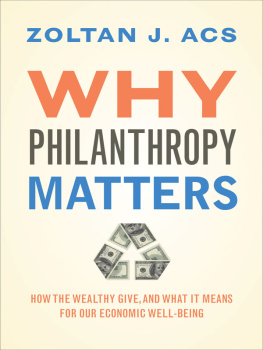Polemics Series
Series Editors
Michael Calvin McGee and Barbara Biesecker, University of Iowa
John M. Sloop, Vanderbilt University
The "Better Angels" of Capitalism: Rhetoric, Narrative, and Moral Identity Among Men of the American Upper Class,
Andrew Herman
Judgment Calls: Rhetoric, Politics, and Indeterminacy,
edited by John M. Sloop and James P. McDaniel
The Rise of Rhetoric and Its Intersections with Contemporary Critical Thought,
Omar Swartz
Without Apology: Andrea Dzvorkin's Art and Politics,
Cindy Jenefsky
FORTHCOMING
Literary Integrity and Political Action,
Kathleen Farrell
To the best angels:
Heidi Tarr Henson and Oliver Tarr Herman
First published 1999 by Westview Press
Published 2019 by Routledge
52 Vanderbilt Avenue, New York, NY 10017
2 Park Square, Milton Park, Abingdon, Oxon OX14 4RN
Routledge is an imprint of the Taylor & Francis Group, an informa business
Copyright 1999 by Taylor & Francis
All rights reserved. No part of this book may be reprinted or reproduced or utilised in any form or by any electronic, mechanical, or other means, now known or hereafter invented, including photocopying and recording, or in any information storage or retrieval system, without permission in writing from the publishers.
Notice:
Product or corporate names may be trademarks or registered trademarks, and are used only for identification and explanation without intent to infringe.
Library of Congress Cataloging-in-Publication Data
Herman, Andrew, 1957
The better angels of capitalism: rhetoric, narrative, and moral
identity among men of the American upper class / Andrew Herman.
p. cm. (Polemics)
Revision of the author's thesis (Ph.D.)Boston College.
Includes bibliographical references and index.
ISBN 0-8133-3354-7 (hc)
1. Upper classMoral and ethical aspectsUnited States.
2. WealthMoral and ethical aspectsUnited States. 3. Rich
peopleUnited StatesLanguage. 4. PhilanthropistsUnited States
Language. I. Title. II. Series.
HT653.U6H47 1999
305.5'2'0973dc21 98-27713
CIP
ISBN 13: 978-0-367-29032-0 (hbk)
Many books have a long gestation period, but the gestation of this book has been longer than most. I began research on this project in 1985, and if someone had told me at the time that it wouldn't be published until almost the dawn of the new millennium, I would have wished them and myself dead on the spot. But here I am, still alive, in the summer of 1998, wishing and writing this book toward its telos, and it's time to give an accounting of those who were essential to its birth, life, and happy conclusion. In spite of the fact that mine is the only name that signifies authorship of this work, it is the product of the gifts that have been bestowed upon me by many people and institutions over the past thirteen years. Now that the work is "finished," it is time to return the gifts of thanks to its many benefactors.
This book had its origins in the Study on Wealth and Philanthropy, conducted by the Social Welfare Research Institute at Boston College. The study provided the research upon which this dissertation is based and was made possible by grants from the Thomas B. Murphy Foundation Charitable Trust. In the course of doing the research for the Study on Wealth and Philanthropy, I had the opportunity to work with many individuals who helped to bring that project to fruition. In particular, I would like to thank Ethan Lewis, Lynn Rhenisch, and Leslie Sarofeen for their unfailing humor, grace, perseverance, imagination, and insight in helping to manage and make sense of what was an exciting, yet often chaotic, enterprise. Without their virtue, and the virtue of many others at the Social Welfare Research Institute who helped in the management of the project, the fortune of this project would not have been possible. Subsequent to the research itself, the writing of the dissertation upon which this book is based was aided by a doctoral fellowship from the Indiana University Center for the Study of Philanthropy. I would to like thank both of these institutions, as well as Tom Murphy himself, for their generous support of my research and writing.
While I was working on the research project and the doctoral dissertation that followed, there were many who contributed their intellectual energy, spirit, and insight to the cause. In listing them here, I sincerely hope that I am not forgetting anybody. Russell Eckel, Avery Gordon, Sandra Joshel, Jackie Orr, Joseph Mendoza, Andrew Haase, Clive Smith, Janet Wirth-Cauchon, Alex Wirth-Cauchon, and Larry Zaborsky were all participants, in various forms and at various times, in an extended conversation concerning the "better angels" of capitalism. To them is due much gratitude and respect. Avery Gordon deserves special thanks for the trip to Savannah, where I read and heard the story of the three testicles. Sandra Joshel also warrants a gesture of specific gratitude. Many years ago, when both I and this project were floundering, Sandra Joshel enlisted me in what became known, in her unforgettable words, as the "Triumph of the Will Writing Camp." The book before you had its origins in a very long and difficult tape-recorded conversation between Sandra and I in her living room. As the ideas in that initial conversation were transformed from vague thoughts to written words, Sandra graciously lended her considerable talents to the production of the first version of this book.
I must also thank the members of my dissertation committee at Boston College. Paul Breines, Stephen Pfohl, and Paul G. Schervish lent their unfailing encouragement and support during the many years it required to complete the dissertation. They were exceedingly generous in terms of their time, intellect, and patience as I struggled with the project. Both Stephen Pfohl and Paul G. Schervish deserve a special and specific gesture of thanks. It was through my friendship with Stephen, and my engagement with his uniquely infectious and persuasive intellectual passion, that I came to the theoretical and methodological positions with respect to "doing sociology" that are manifested in this book. If there is anyone to blame for my willingness to transgress the norms and presuppositions of the "discipline" of sociology, it is Stephen. And I also know that he would be proud to accept that responsibility. It is impossible for me to sufficiently thank Paul Schervish. As both chair of the dissertation committee and director of the Study and Wealth and Philanthropy, Paul displayed a faith in my abilities when the chips were down that was extraordinary. I also appreciate the willingness of Bill Gamson of Boston College and John Langdon of Georgetown University to serve as outside readers of the dissertation.
After leaving Boston College I carried this project with me to Drake University, and it has been with the interest and support of my students and colleagues over the past six years that I have been able to transform the dissertation into this book. I tried to subject students in my SOC 172 (Wealth, Discourse, and Power), SOC 199 (Seminar in the Sociology of Knowledge), and Honors 172 (Topics in the Social Imaginary) courses to the theories, themes, and substance of the book, and in return they taught me more about subjectivity than I could ever possibly imagined. In particular, Tanya Beer, Dan Emery, John Jordan, Shane Luitjens, Robin Kneich, Nick Mathern, Jon Rosenfeld, Adam Sitze, and Anne Wallested all gave me gifts of fortune. I would also like to thank my colleagues in the sociology department and the cultural studies program at Drake University, both past and present: Richard Abel, Gregory Crider, Robert Harriman, Deborah Jacobs, Joseph Schneider, Jody Swilky, Thorn Swiss, Ronald Troyer, and Sue Wright. Without their enthusiasm and interest, as well as their willingness to dialogue with my obsessions about this project, it would have never been completed. I must also thank the Drake University Center for the Humanities, which gave me funding for course releases that enabled me to work on the book.


